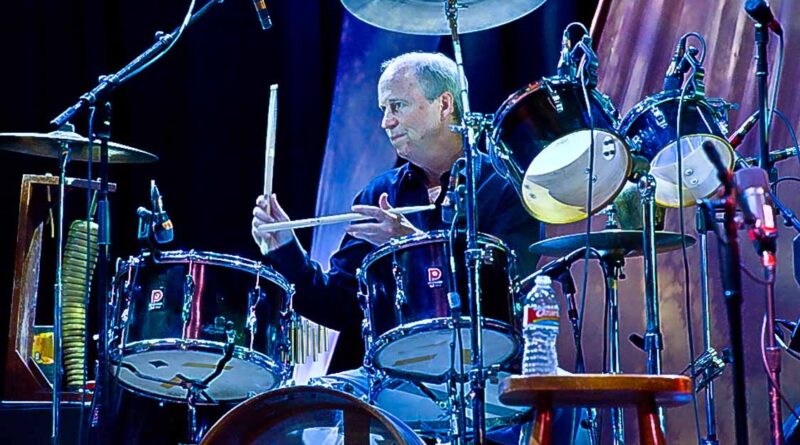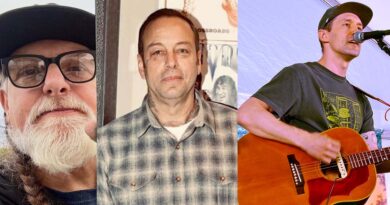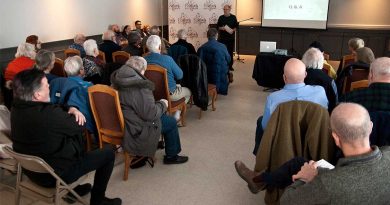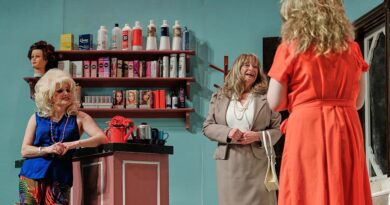Barry Keane, Still Having Fun
By John Swartz
What do all these musicians and groups have in common?
Anne Murray, Bachman-Turner Overdrive, Shania Twain, Dan Hill, Carole King, Roger Whittaker, Ian Tyson, Dave Loggins, The Nylons, April Wine, Ian Thomas, Rita McNeil, Murray McLauchlan, The Northern Pikes, Stan Rogers, The Stampeders, Jann Arden, Hagood Hardy, Valdy, Sharon, Lois and Bram, Keith Hampshire, The Barra McNeils, Nelly Furtado, Matt Minglewood, and Even Steven.
Every one of them has an album Barry Keane played drums or percussion on. The above is just a shortlist. Barry has played on 400 recordings. You probably have an album in your collection he played on.
Or, if you’ve been to a Blue Jays game, he’s on the recording of OK Blue Jays. It’s not a stretch to realize you’ve been listening to his drumming all of your life.
He’s also was Gordon Lightfoot’s drummer for 48 years. He’s still playing Gord’s tunes as a member of the Lightfoot Band.
“I’m having a blast. It’s a lot of work to get to 8 o’clock and you get to play the songs; but you know it’s so gratifying, so heartwarming to hear the response of the people. People love Gord’s songs, and they love the way we play them,” Barry said.
Keeping the band together was a group decision arrived at over lunch in Mississauga in the fall of 2023. They had one question in front of them.
“Do you think people are going to want to come see a Gordon Lightfoot show without Gordon Lightfoot? We didn’t know if people would accept the concept.”
OK, they had two questions.

“I can’t believe how lucky we got. After we decided we were going to carry on, it was, “OK, now what do we do about a singer?” It was Rick Haynes who said, “Do you remember our friend Andy (Mauck)? He checked every box.”
What the heck, there was a third question, what kind of shows would they play?
“We wanted to play in theaters. We weren’t going to be a bar band. There is no way we would have been a bar band. It was theaters or bust. We’ve luckily been able to reach that level. We feel privileged we can carry on playing Gord’s songs the way Gord wanted them performed because he wasn’t shy about how he wanted the songs performed and that’s the way we perform them.”
Barry was exposed to music at an early age when his father, George became head of Quality Records. That connection lead to some interesting opportunities.
“My parents took me to a Ricky Nelson concert in Miami, Florida when I was about ten years old. I looked at Rick Nelson, and with all the screaming girls and everything I said, “I want to be Ricky Nelson.” They gave me guitar lessons and I hated it. It was so much like school and my fingers hurt to hold the strings down and I quickly forgot about trying to be Ricky Nelson,” said Barry.
Five years later Barry would be inspired to learn to play an instrument, and like virtually every drummer who picked up sticks since 1963 it was because of the Ed Sullivan Show, but not for the reason you’d think.
“Way back when I first picked up a pair of drumsticks (at age 15) I wanted to be Dave Clark of the Dave Clark Five. I envisioned myself playing the drums and having screaming girls all around, the rest of all this stuff.”
“I said, “I want to do that. (after seeing the Dave Clark Five on Sullivan)” I never wanted to do Buddy Rich or Gene Krupa. That was never in my mind.”
He soon got a job in the biz, not playing drums, but at Quality Records packing cartons with records to ship out to record stores, eventually moving up to sales and promotion, and then manager of A&R (artist and repertoire). He jumped ship to RCA for the same job and added studio operations manager. Then he went to school.
“But not for being a drummer. I went to learn more about engineering and producing. I went for two two-week summer course in 1968 and ’69 (at Eastman School of Music). My instructor, was a fellow named Phil Ramone, one of the most well-known record producers ever.”
“He was teaching us guys, and when I say us guys (I mean), Jack Richardson who produced so many great Guess Who albums, Bob Ezrin was one of the students there, a fellow named (Paul) Leka (Steam, The Left Banke, Harry Chapin, REO Speedwagon, and Gloria Gaynor), it was a class full of promising producers and engineers. I went there to learn more about producing, but you know what? I learned more about drumming than I think I learned about drumming anywhere. That was because Phil brought 8 track, one inch, tapes we could mix. He brought racks from Dionne Warwick and Jack brought tracks from the Guess Who because he already had These Eyes.”
“I listened to Burt Bacharach’s great arrangements with Dionne Warwick, I could hear what the drummer was playing and it was amazing to me; I was thinking, “why would the drummer be playing that? That’s kind of a funny drum track,” but when you heard it with everything else, it was the perfect part to play. That’s when I really started to learn the place of the individual instruments and in my case the drums. So I approached playing drums on records- how can I fit in, more than – how can I show off, fit in with the arrangement, fit in with the other players.”
It paid off, not just recording with Gord, but with all those other artists mentioned at the top.
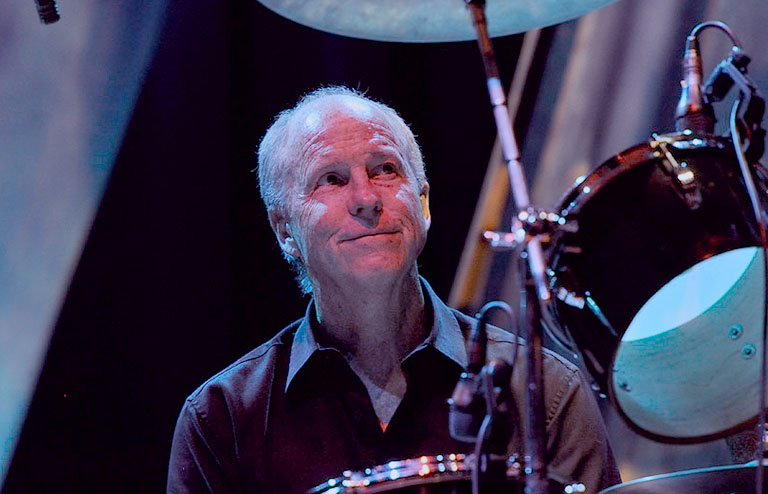
“I was different, especially from the other guys who were getting session work in Toronto. I became sort of the percussion guy for rock bands. I would come in a play tambourine, maracas, shakers” and congas and bongos (that’s him on BTO’s Blue Collar and Looking Out For Number One).
Kind of like Canada’s version of Paulinho da Costa?
“Ha, ha, very good.”
It was because of a session mishap Barry got the call to record with Gord. The drum track was accidentally erased, and rather than wait to get the drummer back, Barry jumped on the drums and replaced the drumming. Recording engineer Mark Smith had heard Barry’s drumming on the song and when Smith was hired to engineer Gord’s Old Dan’s Records in 1972; part of his job was hiring session musicians, so he hired Barry. And that was the start of a beautiful relationship.
Barry didn’t join the band right away. It wasn’t until 1976, a year after he was called in to play drums on Gord’s Summertime Dream album Barry was asked to go on the road. Gord didn’t have a drummer in his band, usually it was only Gord, Rick and Red Shea on stage performing the tunes. Barry become the only drummer Gord employed in his band.
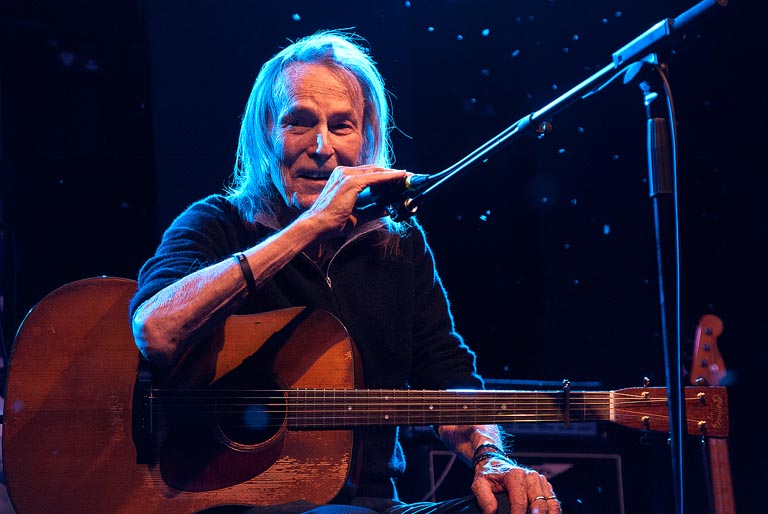
It’s no secret Gord was very particular about his music. He had the idea of how a song should sound. Session players are usually hired to come in and do what they do, make their parts up, and hopefully make the songs better. Gord’s first gig as a musician, aside from singing in church or at school, was as a drummer in the Charlie Andrews Orchestra so one would think Gord had the drum parts for his own songs already in mind.
“He might say, nope, that doesn’t work, play something different, or why don’t you play this. But many times he would leave it up to us to come up with a part.”
“It depended on the song. In the beginning he couldn’t really have much influence on all my parts, although if he heard something he didn’t like he would mention that. As our relationship progressed, he started giving me chord charts, with suggested basic parts and then it would be a collaborative effort. There were some songs he was pretty particular and he had an idea of what he wanted to hear. It kind of evolved over the years.”
Barry was still doing session work in the early days Did parts, or licks travel with him from those sessions to ones with Gord?
“I’m not a schooled musician at all. I play what I feel is correct. Again, my experience at Eastman helped my ears listen to what other musicians were playing. It was the same with Gordon Lightfoot songs. I played what I felt was right for the song and whether I had come from a rock session or a jazz jingle it didn’t really matter I always tried to play what was right for the song.”
While still at Quality, Barry would teach drums at Hutt House of Music in Scarborough in the evenings. Barry said he never took a lesson, except for one time.
“I went early to the El Patio coffee house in Yorkdale to be able to get a seat so I could sit beside Skip Prokop when he was in the Paupers. Just watching him play the drums taught me so much about how to play the drums and I told Skip that many years later. He had no idea but he was one of my drum influences.”
Many musicians have stories about the first time they heard a song they created or played on the radio.
“I remember. What a thrill, and still to this day when I hear a record I played on I still get excited. I think it was You’re Going To Miss Me Girl by Wishbone I produced and played drums on back in 1971.”
There is a bigger jolt of excitement when you hear your music in unexpected places.
“The other great feeling is, if you happen to walk into a bar and there’s a band playing, and they’re playing a song you recorded and the drummer has a copied your parts. That is a feeling that rally gets to me. All the years I copied drummers and now I’m sitting here and somebody has copied a part I came up with.”
Barry is a two sport guy as well, still hitting things. His baseball resume is pretty impressive.
He was on 7 Ontario Provincial Slo-Pitch Championship teams, won medals with different teams at National Slo-Pitch Tournaments. In 1991 he was selected to the Canada East All-Star team and named MVP. He was a member of 3 medal winning teams at the slo-pitch World Championships and was selected to the All-World team in 2003.
“I love baseball. I play music and the people I’m involved in recording have no idea I play baseball. It was the same, the opposite, I played baseball for years and years and people had no idea I was a drummer or that I played with Gordon Lightfoot. I’ve been very lucky, baseball came naturally to me and I became a world champion in slo-pitch. The Toronto softball team was the first Canadian team to win a world championship. I’m very proud of that.”
“The team took me on and because of my schedule, I wasn’t around a lot, I would fill in for tournaments for whoever wasn’t there. I ended up playing almost every position on the field, but basically I like to play in the middle. I was a shortstop, a second baseman or a center fielder.”
You’d think with all his business background he’d naturally be taking care of business with the Lightfoot Band. It turns out things are very different from when Gord and Early Morning Productions were running the show, but he still just shows up and plays.
“Actually that kind of stuff is being handled by Rick Haynes. Rick has become the leader of the Lightfoot Band and Rick is doing a marvelous job of handling all the contractual stuff, all the visas, that kind of stuff.”
“I just hit things.”

Which he will be doing Thursday night at the Opera House when the Lightfoot Band kicks off this year’s Lightfoot Days Festival. It will sound different, but in a good way. You’ll be impressed with Andy Mauch’s singing, and you’ll also be thinking, (if you’ve seen Gord perform in the last 15 years) ‘this sounds better than I remember’.
That’s because the band has made some subtle changes. They haven’t changed any notes or words. You’ll hear Rick and Carter Lancaster singing back up harmonies (they always did, but they were buried in the live mix. And the overall mix for the PA has been tweaked, it sounds rich and fuller, like the records. Plus the guys are looser on stage.
“There is a renewed energy and some of the ways the songs are presented slightly differently than the way they had been presented, especially towards the end of Gord’s career. Yes, there is a new energy.”
That’s because now they aren’t the backing band, they are the band.
“You don’t want to be disrespectful when you are backing up someone like Gordon Lightfoot you want the spotlight to be on them. You don’t want a distraction; you don’t want to take any of Gord’s light away from him. But now, it’s a different situation.”
It’s rejuvenated the guys in the band. They are happy to step into the spotlight, to meet fans after the show, and they are more relaxed while at ‘work’. Barry thinks they’ll be at it for a while.
“There’s no end in sight right now. We’re all having a blast and as long as people want to come and hear the songs, we’re going play them for them. Why quit?”
You can get tickets for the show online. The band is also participating in two workshops Friday at Creative Nomad Studios, one at 1 p.m. and the other at 2:30. John U. Bacon, author of The Gales of November: The Untold Story of the Edmund Fitzgerald is also participating. You need tickets for that as well. Email neergriggmain@yahoo.ca to get on the list and you can pay at the door.
All other Lightfoot Days events are admission free, including the Memories of Lightfoot storytelling and music night Friday at 7 p.m. at Creative Nomad Studios. With the band and Ken Jiggs McDonald, producer John Corcoran (Lightheaded: A Gordon Lightfoot State of Mind), renowned musician Gary Lucas (Me and Bobbie McGee video with Gord, Kris, Ronnie, and Willie), and John U. Bacon, author of The Gales of November: The Untold Story of the Edmund Fitzgerald and musical performances by Steve Porter, Don James, Jack Nicolle, and Samantha Windover.
The rest of the event schedule includes:
- Venues: Even Steven is at Lake Country Grill Saturday night; Don James and Jack Nicolle are at Apple Annie’s in the afternoon, Geoff Booth will be at Alleycats Music.
- Saturday from 11 a.m. to 1 p.m. John U. Bacon will be at Manticore Books to sign copies of The Gales of November: The Untold Story of the Edmund Fitzgerald.
- Proclamation of Gordon Lightfoot Day by Mayor Don McIsaac at the Opera House at 11 a.m.
- Lightheaded: A Gordon Lightfoot State of Mind screening at Creative Nomad Studios at 1 p.m. Saturday.
- Memorial Church service in memory of Gordon Lightfoot at St. Paul’s United Church with Jakob Pearce and a new choral arrangement by Jim Lewis of If You Could Read My Mind, Sunday at 10:30 a.m.
- Closing Ceremony at Mariposa Market, with cake, at 12:30 p.m. Sunday.
- Wrap-up Party at Picnic with High Steppin’ Strutters Sunday at 1:30 p.m.
(Photos by Swartz – SUNonline/Orillia and Images Supplied)

